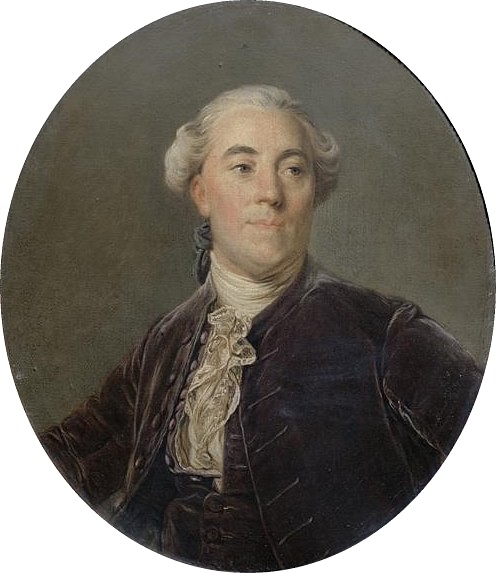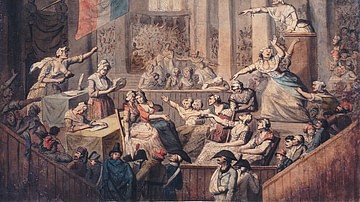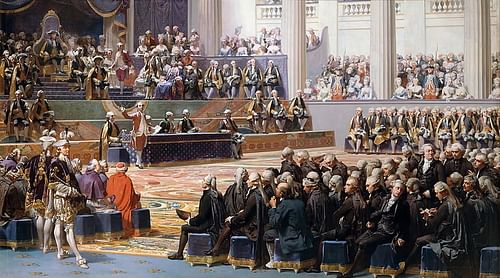
The Estates-General of 1789 was a meeting of the three estates of pre-revolutionary France: clergy, nobility, and commons. Summoned by King Louis XVI of France (r. 1774-1792) to deal with financial and societal crises, it ended with the Third Estate breaking from royal authority and forming a National Assembly. It is generally considered the start of the French Revolution (1789-1799).
First created in 1302 as an advisory body to King Philip IV of France (1285-1314), the Estates-General had traditionally been consulted on fiscal policy and had presented the king with petitions and grievances from the estates. Although it had no legislative power of its own, its authority came from its role as the voice of the people. Yet the Estates-General was not a sitting body and was only called intermittently at the king's will. As the French kings began to centralize power and pursue policies of absolute monarchy, the Estates-General was convened less often. Upon the close of the 1614 meeting, it would not be called again until 1789, 175 years later.
In the tumultuous years preceding the Revolution, an Estates-General was seen as necessary to fix the imbalances within French society, particularly when it came to the Third Estate. As matters worsened in the 1780s, leading to conflict between the monarchy and the estates, Louis XVI eventually had no choice but to summon one, sealing the fate of his own monarchy and France itself.
Background: The Kingdom Unravels
By the spring of 1789, the threads that made up France's Ancien Régime were quickly coming undone. A financial crisis that had been brewing for years had finally reached its tipping point in August 1788, when the French treasury was declared empty. The crisis resulted from decades of lavish spending by the monarchy, notably in the form of expensive military endeavors such as the French involvement in the American Revolution. Disjointed systems of taxation that varied from province to province also added to the kingdom's financial woes, a situation worsened by the tax-exempted status of the first two societal orders, the clergy and nobility. Most of the kingdom's tax burden was placed at the feet of the third order, which constituted somewhere between 90-98% of the population and included the poorest members of society.
Attempts at financial reform by the ministers of King Louis XVI repeatedly failed. The Assembly of Notables of 1787, which had been intended to rubberstamp a series of radical reforms meant to save the state from bankruptcy, had backfired when its members declared that only an Estates-General had the authority to weigh in on fiscal matters. The Parlement of Paris, the highest judicial court in the kingdom, agreed with this decision and refused to register the king's reforms, despite having previously claimed responsibility for overseeing financial matters in the absence of an Estates-General.
This led to a dispute between royal and parliamentary authority, the Revolt of the Parlements, in which the 13 parlements of France won the support of the people by advocating for an Estates-General and by holding out against tyrannical abuses of royal power, such as arbitrary arrests. The revolt only ended in August 1788 when the king's chief minister resigned and was replaced by Jacques Necker (1732-1804), the popular Genevan banker and former finance minister to the king. Necker promised a meeting of the Estates-General for 1789 and restored power to the beloved parlements.
Necker's appointment saved the treasury since his promise of an Estates-General gave creditors enough faith to let him take out new loans to keep the kingdom afloat. Yet, France was still navigating dire straits. The Revolt of the Parlements had led to riots and unrest throughout the country, which were only exacerbated by a string of unfortunate weather conditions. In July 1788, a freak summer hailstorm destroyed many of the crops in the Paris Basin. This was followed by a draught which was followed by the longest and cruelest winter France had seen in 80 years. Heavy snowfalls occurred almost every other day well into April 1789. Deeply frozen rivers and immobilized mills meant a loss of production, which led to a rise in unemployment at a time when bread prices were skyrocketing.
In normal times, an average urban worker would spend half his income on bread, but in the spring of 1789, the better-off were spending two-thirds of their wages solely on bread, while the worst-off could spend up to nine-tenths of their income on it. During the winter of 1789, as noted by the Duke of Dorset, "the wretchedness of the poor…surpasses all description" (Doyle, 87). For many, the upcoming Estates-General was the only hope left for change.
Elections & Grievances
The question on everyone's minds in the months leading up to its convening was what a revived Estates-General would look like after 175 years dormant. In September 1788, the recently restored Parlement of Paris declared that the make-up of the Estates-General should be the same as it had been when it last met. This proved an unpopular decision that made the parlements lose their immense popularity almost overnight.
This idea was hated for two reasons. In 1614, each estate had been allotted an equal number of representatives, ignoring the fact that most Frenchmen resided in the Third Estate. Furthermore, in 1614, each estate had been granted only one vote each, meaning the upper estates could always outvote the third. For many, following this structure in 1789 would be unacceptable.
Following this backlash, a second Assembly of Notables met in November to discuss doubling the representation of the Third Estate. Although the notables voted against this proposal, their decision was ultimately overruled by Necker, who wished for the upcoming meeting to go as smoothly as possible. The Third Estate was therefore allotted a representation of 578 deputies compared to the 303 for the clergy and 282 for the nobility.
The deputies were chosen through an elective process that began in February 1789 and would last in some places well into June. Constituencies were drawn up from the medieval bailliage jurisdictions, with minor adjustments made to account for a rough parity of size and population. Each of these constituencies had a separate electoral assembly for each order, with every constituency expected to produce two clerical, two noble, and four Third Estate deputies. Alongside the elections, each constituency was also obliged to come up with a list of grievances, or cahiers, to guide the discussion of the Estates-General.
There were flaws in this process, of course, especially by modern standards. Only male taxpayers over the age of 25 could vote, and the process of starting the drafting of the cahiers at the lower levels of society and redrafting them later on meant that the concerns of the poorest peasants were largely left out of the final drafts. Those of the Third Estate who were elected were also mostly wealthier bourgeoisie, men of education and leisure, two thirds of whom came from legal backgrounds. This was because elected representatives were expected to pay for their own expenses while the Estates-General sat at Versailles and also because poorer laborers, many of whom had families to feed, could not afford to suspend their work to campaign for election. No peasants or artisans made it past the first round of elections.
Still, the elections and the listing of cahiers were monumental democratic achievements for their time. Scholar William Doyle writes that up to that point, the elections of 1789 were "the most democratic spectacle ever seen in the history of Europe, and nothing comparable occurred again until far into the next century" (97). Over six million people partook in the electoral process, and over 25,000 cahiers were drawn up, many of which decried the privileges of the upper estates, bemoaned abuses of power within the Ancien Régime, and called for a new constitution. While many anticipated the Estates-General would result in a transfer of power to the people, most envisioned something similar to Great Britain's Glorious Revolution of 1688, where the king would share power with something resembling Britain's parliament. At this early stage, few were calling for the radical step of creating a republic.
As elections continued, pamphlets circulated the streets of major cities, outlining what the Third Estate should try to achieve at Versailles. The most famous and influential of these was entitled What is the Third Estate? written by the abbé Emmanuel Joseph Sieyès (1748-1836). On the basis that the Third Estate made up the overwhelming majority of France's population of 27 million, Sieyès argued that this estate made up the entirety of a nation on its own. Since the privileged upper estates contributed little to taxation or population, they were but dead weight; in his pamphlet, Sieyès compared them to a malignant disease which "preys upon and tortures the body of a sick man" (Schama, 304). Sieyès' work would win him election as a representative to the Third Estate, forsaking his own clerical order.
Throughout all this, tensions continued to rise throughout France, as the lower classes starved. Things boiled over on 28 April, when several thousand rioters descended on the home and factory owned by wallpaper manufacturer Jean-Baptiste Reveillon, who, despite having a reputation for paying his workers well, had been misquoted advocating for lower wages. Shouting "Down with the rich!", rioters ransacked Reveillon's properties. Soldiers were called in, and the crowd was fired upon. Casualty estimates vary wildly; at least 25 people were killed, but rumors raised the number of dead to as high as 900. Occurring only days before the Estates-General, this act of bloodshed only added to the tense atmosphere of the meeting.
The Estates-General Convenes
On 5 May, the Estates-General convened in Versailles amidst general jubilation. Although the estates were gathered together for the opening ceremonies, the Third Estate already found itself isolated. Aside from having to wait 3 hours to bow before the king, much longer than the others, the Third Estate was also singled out in the matter of attire. Each estate had been assigned a costume, dictated by tradition; while the First Estate were adorned in their vestments, and the Second wore plumed hats, silk clothing, and swords at their hips, the Third were allowed to dress only in somber black, as if at a funeral.
The king marked the opening of the Estates-General with a conventional yet boring speech, followed by the Keeper of Seals, whose speech was similarly conventional but utterly inaudible. Jacques Necker's voice gave out half an hour into his three-hour speech, which had to be finished for him. Disappointing many in the Third Estate, Necker's speech focused mostly on the financial problems the country faced and barely mentioned the social issues that most believed to be the real focus of the Estates-General. Once Necker's speech had been read, the meeting was concluded for the day, nothing having been discussed or accomplished.
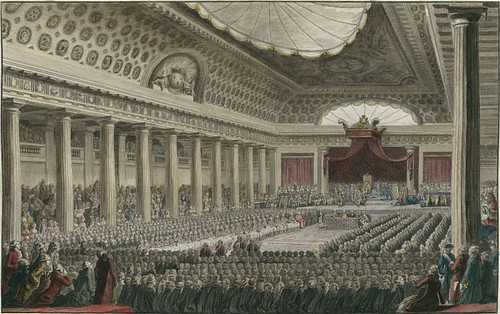
The next day each estate was tasked with verifying the results of its own elections. This, however, was a problem. If every estate was left to verify its elections in isolation from the others, it could very easily lead to the estates voting in isolation as well. This was unacceptable to the Third Estate, who knew that such a format would lead to them being outvoted on every issue. The Third Estate, therefore, refused to verify its elections, or conduct any business at all, while it was still in isolation from the other estates.
The nobility, believing the Third Estate to be making mountains from molehills, disregarded their concerns and voted in favor of separate verification. However, the clergy, the majority of whose representatives were parish priests sympathetic to the commoners, remained divided on the issue. Before long, the Third Estate, now calling themselves the Commons, went even further by demanding votes should be counted by head, rather than by estate. The nobility again refused to accept such conditions. Before any formal discussions could even be had, it seemed that the Estates-General had stalled.
On 26 May, a frustrated Louis XVI intervened, condemning the estates' inaction and demanding they come to a swift solution. However, the death of the sickly seven-year-old Dauphin on 4 June called away the king's attention and effectively paralyzed his ministry. With the king distracted and the nobles refusing to compromise, the Third Estate began to seriously consider reorganizing themselves into a national assembly, and conducting business on their own.
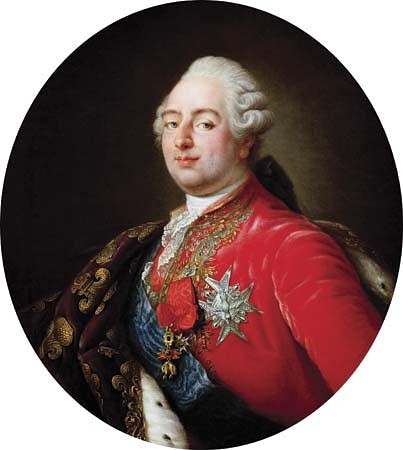
On 11 June, Sieyès put forth a motion to formally invite the other estates to join the Commons in crafting a national assembly. The following day, after receiving no responses, the Commons went ahead with roll-call. This was a significant move and a point of no return, as the Third Estate was not only denying the authority of its fellow estates but was also taking power into its own hands without the king's consent. Since the Third was the only estate to allow spectators, news of this development quickly spread to Paris and beyond.
On 13 June, three parish priests left their order and joined the Third. In the next few days, 16 others joined them. Since this new body was made up of more than just deputies from the Third Estate, a new name was needed, and on 17 June, the title of National Assembly was adopted. In the excitement of the moment, the Assembly unanimously agreed that all existing taxation was illegal, but would be temporarily sanctioned until a new system could be agreed upon. The same day, astronomer Jean Sylvain Bailly (1736-1793) was elected president of the Assembly. These actions were a direct challenge to royal authority, made more urgent when, on 19 June, the First Estate formally voted to join the National Assembly.
Tennis Court Oath
Threatened by these developments, the king's ministers argued over what to do. Necker, believing the Third Estate must be reconciled with, proposed that the king should hold a royal session to reassert his authority. The king agreed to this plan, deciding to hold the session on 23 June. However, no one bothered to inform the deputies of the decision. On 20 June, the deputies arrived to find the hall where they met locked and guarded by soldiers. Uninformed of the royal session, the deputies misinterpreted this as an act of despotism against them. Refusing to be dispersed, the National Assembly met in the royal tennis court, where each member took an oath to not disband until a new constitution could be established.
Although Necker worked to reassure the deputies that no offense had been intended, animosity had already sprouted. At the royal session on 23 June, the king attempted to reassert his power by declaring all the decisions the Assembly had made on the 17th to be null and void. He conceded that no future taxes would be raised without the Estates-General's consent and that he would end the practice of arbitrary imprisonments and abolish serfdom. The king also advised the Second Estate to give up its privileges, although he did not command it to do so.
While these promises might have been enough to placate the Third Estate had they been made a month before, it was by now much too late. Upon seeing their reluctance, Louis XVI reminded them of his power, stating that nothing the estates did was valid without his approval, and commanding each estate to return to its separate quarters. The Third Estate refused this command, with one of its leading voices, Honoré-Gabriel Riqueti, comte de Mirabeau, proudly proclaiming, "we are here by the will of the people, and can only be made to leave by the force of bayonets" (Davidson, 21).
The defiance of the Third Estate made an impact. That night, crowds burst into the palace, cheering Necker and Third Estate deputies while heckling those who opposed the Assembly. Soldiers offered no resistance to the crowds and only interfered when two archbishops were about to be lynched. The following day, 48 nobles joined the National Assembly. This appeared to be the writing on the wall, and on 27 June, the king conceded, ordering the holdouts of the First and Second Estates to join the Assembly. With this command, the Estates-General had finished morphing into the National Assembly. A new order had arisen in France and with it, a revolution.
Aftermath & Significance
Adhering to its promises, the Assembly soon went to work on a new constitution, but the king was not content to sit quietly as it did so. Toward the end of June and beginning of July, a massive build-up of military troops took place in the Paris Basin, with 30,000 troops being garrisoned in the region by 1 July.
When the Assembly passed a motion asking the king to withdraw the soldiers, he refused, stating they were only there to maintain order. At the same time, Louis XVI fired and replaced several of his ministers, committing his most egregious act on 11 July when Necker was dismissed and ordered to leave the country immediately. These factors, combined with rising bread prices, contributed to the Storming of the Bastille on 14 July.
The Estates-General is considered by many historians to be the first event of the French Revolution. The meeting saw the Third Estate usurp authority from both the crown and its fellow estates, asserting the right to legislate and create a new constitution. It was a relatively orderly and peaceful transition of powers, a different kind of revolution to the chaos and bloodshed that was soon to follow.

